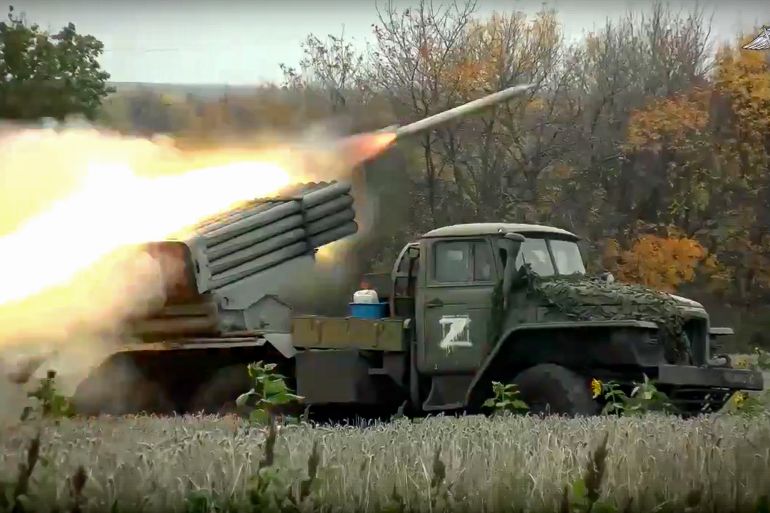‘Shrinking operation’: Russia names new Ukraine war commander
After weeks of battlefield defeats, Moscow appoints air force chief General Sergey Surovikin to lead the faltering war in Ukraine.

Russia has appointed a new general to lead the war against Ukraine after suffering a series of military setbacks that triggered rare criticism of the battlefield command.
General Sergey Surovikin was appointed “commander of the Joint Grouping of Forces in the areas of the special military operation”, the Russian defence ministry said on Saturday, using the Kremlin’s term for the invasion of Ukraine.
Keep reading
list of 4 itemsUkraine battles Russian advance in key town of Bakhmut
Key bridge linking Russia to Crimea damaged in explosion
Russia-Ukraine war: List of key events, day 227
Surovikin, 55, marks Moscow’s third senior military appointment in the space of a week.
The change follows the reported sacking earlier this week of the commanders of two of Russia’s five military regions, as its forces have suffered dramatic reverses in northeastern and southern Ukraine in recent weeks.
According to the defence ministry’s website, Surovikin was born in Siberia’s Novosibirsk region, and has led Russia’s Air and Space Forces since 2017.
Surovikin had combat experience in the 1990s conflicts in Tajikistan and Chechnya and, more recently, in Syria, where Moscow intervened in 2015 on the side of Bashar al-Assad’s government. He was accused of overseeing a brutal bombardment that destroyed much of the city of Aleppo.
Until now Surovikin led the “South” forces in Ukraine, according to a defence ministry report in July.
The name of his predecessor has never been officially revealed, but some Russian media said it was General Alexander Dvornikov – also a general of the second Chechen war and Russian commander in Syria.
‘Shrinking of operations’
Alexandre Vautravers, from the Swiss Military Review, noted the beginning of the Russian invasion did not take place under a unified command, as there were five different army groups each leading autonomous operations.
That will change under Surovikin’s leadership of the war, he said.
“The reason it was not possible to have a unified command of all the Russian forces was the distance and lack of information technology to put together all of the command and control facilities and capabilities,” Vautravers told Al Jazeera.
“What we are seeing now is one person and one headquarters is going to plan out and direct the operation. But it is also a signal that from now on the operation will concentrate on one specific area. It may be Luhansk, it may be Donetsk, it may be in the south. What we are seeing is a shrinking of the operation of Russia.”
The decision to give Surovikin the war command – unusually made public by Moscow – comes after a series of crushing defeats suffered by the Russian army in Ukraine.
Russian forces were driven out of much of the northeastern Kharkiv region in early September by a Ukrainian counteroffensive that allowed Kyiv to retake thousands of square kilometres of territory.
Russian troops also lost territory in the southern Kherson region as well as the Lyman transport hub in eastern Ukraine.
‘A difficult period’
The setbacks led to growing criticism of the military leadership, including from Russia’s elite.
Chechen leader Ramzan Kadyrov called for the firing of a top general last week, while a senior lawmaker, Andrei Kartapolov, urged military officials to stop “lying” about the situation on the battlefield.
Moscow has continued to suffer wartime losses.
On Saturday, a Kremlin-backed official in Ukraine’s Kherson region announced a partial evacuation of civilians from the southern province, one of four illegally annexed by Moscow last week.
Kirill Stremousov told Russia’s state-run RIA Novosti agency that young children and their parents, as well as the elderly, could be relocated to two southern Russian regions because Kherson was getting “ready for a difficult period”.
On Friday, Moscow said its forces captured ground in the eastern Donetsk region – the first claim of new gains since Kyiv’s successful counteroffensive that has rattled Moscow’s military campaign.
Donetsk, partially controlled by Kremlin-backed separatists for years, is a key prize for Russian forces, which sent troops to Ukraine into on February 24.